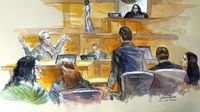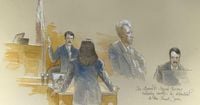FORT PIERCE, Fla. — The federal courthouse in this quiet Florida city has become the unlikely stage for a dramatic legal showdown, as Ryan Routh, a 59-year-old former construction worker from North Carolina, stands trial for the attempted assassination of former President Donald Trump. The case, which has gripped the nation’s attention since the September 15, 2024, incident at Trump International Golf Club in West Palm Beach, has taken on a surreal air as Routh, facing life in prison, has chosen to represent himself in court.
Routh’s story is as tangled as it is extraordinary. According to the Associated Press, Routh, who had recently relocated to Hawaii, was arrested after a Secret Service agent identified him lurking in the shrubbery near the sixth hole of the golf course, rifle in hand, as Trump played nearby. The agent testified that Routh aimed the rifle at him, prompting the agent to fire. Routh dropped his weapon and fled, but was apprehended after a dramatic police chase that ended with his arrest along a nearby interstate.
Prosecutors allege that Routh spent weeks meticulously planning the attack. FBI Supervisory Special Agent Kimberly McGreevy testified that digital forensics and surveillance footage placed Routh at the golf club in the days leading up to the attempt. Cellphone records showed that, shortly before the incident, Routh sent separate text messages to his three adult children and his fiancée, telling them he loved them. Later that day, from the Palm Beach County jail, he called his fiancée to inform her of his arrest. "Everybody knows, it’s been hours," she replied on a recorded call, highlighting how quickly news of the attempt had spread.
The prosecution’s case was formidable. Over two weeks, they called 38 witnesses, including forensics experts, FBI agents, and Secret Service officers. Hundreds of exhibits—ranging from text messages and call logs to bank records and DNA evidence—were introduced. McGreevy detailed how Routh’s DNA was found on the rifle scope grip, a glove, a bungee cord, and a bag recovered from what authorities called the "sniper’s nest." The rifle, an SKS, was confirmed by expert testimony to be capable of hitting a target at the 375-yard distance from which Routh allegedly took aim.
Routh has pleaded not guilty to charges of attempting to assassinate a major presidential candidate, assaulting a federal officer, and multiple firearm violations. If convicted, he faces the possibility of life behind bars. He has also pleaded not guilty to state charges of terrorism and attempted murder.
In a move that has baffled legal experts and frustrated the court, Routh opted to act as his own attorney. Judge Aileen Cannon, who previously presided over the high-profile classified documents case against Trump, approved Routh’s request to represent himself after two hearings in July 2025. Routh explained his decision by criticizing his court-appointed public defenders, saying, "How are they supposed to represent me and say I’m not a dangerous person when they don’t believe that?" His former attorneys have since served as standby counsel, present in the courtroom but unable to intervene unless requested by Routh.
Monday’s proceedings, the defense’s turn to present its case, were marked by confusion and tension. Routh, at times visibly overwhelmed, struggled to keep his questions within the bounds of legal procedure. His witness list was a stark contrast to the prosecution’s: just three individuals, including Michael McClay, a gun specialist; Atwill Milsun, a family friend; and Marshall Hinshaw, a former colleague.
McClay, who was subpoenaed to testify and made clear he did not wish to appear for the defense, answered Routh’s questions about the SKS rifle’s operability and range. He confirmed that the rifle could hit and inflict damage on a target 375 yards away, though he noted that accuracy depended on the shooter’s skill. The cross-examination by prosecutors reinforced the weapon’s lethality at that distance.
Routh’s character witnesses attempted to paint a picture of a peaceful, community-minded man. "You were very well-liked," Hinshaw told Routh on the stand, adding, "I would not expect you to harm anyone." Milsun echoed this sentiment, saying, "You’ve always been a jolly person," and describing Routh’s generosity to the local community. However, both admitted under cross-examination that they had not spoken to Routh in years, and Milsun was unaware of allegations that Routh had previously run over an employee with his truck.
Throughout the defense’s presentation, Judge Cannon repeatedly had to intervene, instructing the jury to disregard certain questions and reminding Routh of courtroom procedure. At one point, after Routh asked a witness about meeting skateboarding legend Tony Hawk and proposed co-hosting an international music festival in Taiwan, Cannon cut him off: "I’ve given you a great deal of latitude, [but] this must cease." His attempts to introduce new evidence, including a "brand new flashlight item," were rebuffed for lack of proper foundation.
Routh ultimately chose not to testify on his own behalf, telling the judge he was certain of his decision after being pressed repeatedly. "A year," he replied when asked if he’d had enough time to consider. This decision, experts say, may have spared him from a bruising cross-examination but left his defense thin, consisting mostly of character testimony and technical questioning about the rifle.
Outside the courtroom, Routh’s family has remained steadfast in their support. His daughter Sara and son Adam flew in from Hawaii to attend the trial. "To be there for our father and support and stand by him, and we will always support my father no matter what," Sara told WPLG Local10.com. She described the trial as "all bulls---" and expressed frustration at how her father’s statements and questions were being "shut down" by the court. Sara also rejected prosecution claims about a letter Routh allegedly wrote to the International Criminal Court and threats against neighbors, demanding proof and calling the allegations "complete bulls--- lies."
Sara further criticized Judge Cannon, arguing that her prior dismissal of the classified documents case against Trump rendered her biased. "She should have recused herself from the beginning. Obviously biased, anybody knows that, because she let Trump off on his charges last year," Sara said.
Legal analysts say Routh faces an uphill battle. "The key for Routh is convincing at least one juror that he did not intend to kill Trump, and that he didn’t take a substantial step toward committing the crime. A high bar for him," former prosecutor David Weinstein told WPLG Local10.com. All 12 jurors must agree on a verdict, and closing arguments are scheduled for Tuesday, with each side allotted nearly two hours. Jury deliberations will follow.
This trial comes just nine weeks after another attempt on Trump’s life in Pennsylvania, where a gunman fired eight shots, grazing Trump’s ear before being fatally shot by a Secret Service sniper. The heightened security and political tensions surrounding the case have only added to its national significance.
As the trial draws to a close, the fate of Ryan Routh—and the broader questions about justice, political violence, and self-representation—hang in the balance, awaiting the jury’s decision.


